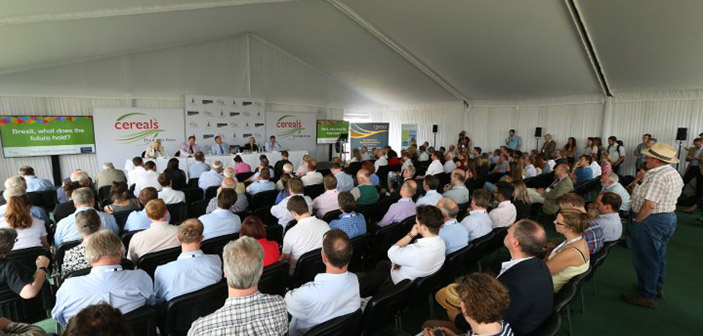With the net zero target on the horizon, Cereals is focusing on both best practice and emerging scientific developments to help farmers adapt to and mitigate climate change.
A series of seminars set to take place this Cereals, brings together experts from the AHDB, CHAP, the IEMA and more to highlight what the agriculture industry is already and can be doing to achieve net zero.
“Boosting agriculture’s contribution to achieving net zero, and therefore actively addressing the issue of climate change, should be a priority for all involved in the food chain,” said Dr Ruth Bastow, innovation director at CHAP.
An essential part of CHAP’s mission is to provide the solutions, networks and expertise needed to support this journey, and further enhance sustainable farming practices, added Dr Bastow. “This is a collective goal and we can contribute a lot as an industry – from optimising tillage to reduce machinery inputs and carbon emissions, to using data to inform crop management decisions.”
In the AHDB theatre, Minette Batters, president of the NFU, will outline the road to net zero, while scientists and farmers will explore the practical solutions available. Harry Henderson, knowledge exchange technical manager at AHDB, will chair a Monitor Farmer debate, covering both sides of the coin. “There’s a huge range of opinions on net zero and whether it’s achievable is the crux of where we’ll head with the debate.
“Are we going to see agriculture become more mixed so that cereal growers also raise livestock, creating wider rotations and using manure to build soil organic matter? Or will we see a reduction in horsepower, a revision in the use of fertilisers and plant nutrition, or probably both?”
Behind all of these potential changes lies the question of responsibility; does it lie with farmers, transporters, processors, retailers or consumers? “Everyone needs clear guidelines on this because there are grey areas,” explained Mr Henderson.
 He added that some farmers are already embracing steps towards net zero through practices like regenerative agriculture, but others are just realising that something is going to have to shift if they can’t obtain more value from their crops.
He added that some farmers are already embracing steps towards net zero through practices like regenerative agriculture, but others are just realising that something is going to have to shift if they can’t obtain more value from their crops.
Wendy Harwood, senior scientist at the John Innes Centre Science emphasised the role science has to play with genome editing allowing plant varieties to be developed much faster than previously possible. “It produces the same results that we would get from conventional breeding, but much quicker, as we can precisely tweak the crop’s DNA to get the exact trait wanted.”
The first developments are likely to be along the lines of disease resistance, with a wheat that is resistant to mildew already developed. “It’s likely that genome editing will foster other developments such as improved nutritional content or better storage properties,” added Prof Harwood.
With hurdles such as legislation and the differentiation between genome editing and genetic modification, to overcome, Prof Harwood explained “These two are quite different. In its simplest form genome editing only involves small changes to the existing DNA whereas genetic modification adds something new.”
With difficulties surrounding legislation holding up some advancing technologies , areas such as carbon offsetting are able to steam ahead. The likes of Gentle Farming is enabling regenerative farmers to benefit financially from their activities. Thomas Gent started looking into carbon credit schemes in the first Covid lockdown in 2020 and now operates the UK’s first internationally certified soil carbon offsetting scheme, already having plenty of demand from buyers and farmers alike.
Using field data as well as satellite imaging, farmers can measure improvements in carbon storage from practices like reduced tillage, cover cropping and reduced fertiliser input, he explains.
Certified to ISO14064 and international carbon standards, farmers can generate money from their carbon stores.
But regenerative farming is not just about carbon, it encompasses water quality and biodiversity, as well as helping farmers to tell their own individual stories in their journey to improve soils and combat climate change, said Mr Gent. “Net zero is not a problem, it’s an opportunity.”
The Cereals Event will be held in Lincolnshire on 30 June – 1 July 2021 and will comply with all required biosecurity measures against Covid-19. For more information or to register for tickets visit cerealsevent.co.uk.


